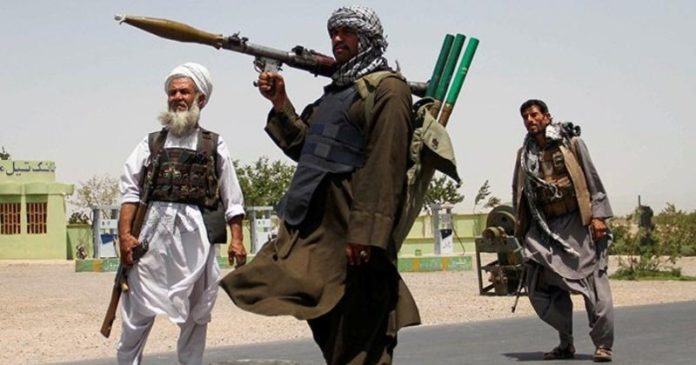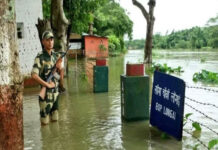The Taliban aggression continues as it seizes control of key cities in Afghanistan and it will be a matter of time before Kabul may fall to them. In such a scenario, India will have to shut down its embassy in Kabul.
With Taliban making attempts to gain more territories inside Afghanistan soon after the US/NATO forces pullout, and violence increasing, India has decided to withdraw its diplomats from the war torn nation.
“More than 100 districts have fallen to Taliban control since the US withdrawal from Afghanistan. It is very important to remember that Afghan security forces are currently on defensive so far but they will start attacking soon, ” Kabul based journalist Said Amir Akbari tells Financial Express Online.
According to Indian Army veteran Maj Gen Nalin Bhatia, “Taliban’s rapid advance would surely have unnerved Iran and other countries to the north including Russia. The fact that Taliban’s ground soldiers continued to advance while Taliban and Afghan peace delegations were in Tehran trying to negotiate shows that Taliban has been unrelenting in its pursuit of taking control of Afghanistan at the earliest, the charade of talks by Taliban with various stakeholders in Afghanistan notwithstanding.”
India has lately been playing an active role to secure its interests in Afghanistan. However, Indian move continue to rest on the shoulders of others, most prominently Iran and Russia, besides the current regime led by President Ashraf Ghani.
“With collapse of the present government imminent in the days ahead, it would be naïve to assume that the countries on which India is banking for support in Afghanistan would help it much, since securing their own interests with the new regime would be paramount,” Maj Gen Bhatia opines.
Over the weekend, as part of India’s contingency plan, almost 50 diplomatic staff, which included the ITBP personnel too, were evacuated from the Consulate located in Kandahar. According to reports, the Indian Consulate is not closed; it continues to operate with the local staff.
India is keeping a close watch and reviewing the situation which is highly volatile and fluid and is ready with a contingency plan to respond to challenges within 48-72 hours.
In response to media queries related to the situation in Afghanistan, the official spokesperson of MEA Arindam Bagchi said, “Due to the intense fighting near Kandahar City, India based personnel have been brought back for time being, because the safety and security of our personnel is paramount.”
Emphasizing that evacuation of the Indian personnel was purely temporary, the spokesperson added, “The work in the Indian Consulate continues through our local staff members. The evolving security situation in Afghanistan is being monitored very closely.”
According to MEA, “India remains committed to a peaceful, sovereign and democratic Afghanistan. All arrangements are in place to provide visa and consular services through the Embassy in Kabul.””
The Taliban aggression continues as it seizes control of key cities in Afghanistan and it will be a matter of time before Kabul may fall to them. In such a scenario, India will have to shut down its embassy in Kabul. So far, Indian diplomatic staff are working in the Indian Missions located in Kabul and Mazar-e-Sharif. The missions in Heart and Jalalabad were already shut down in 2020.
Sharing his views with Financial Express Online, Kabul based journalist Said Amir Akbari says, “At present the security situation in entire Afghanistan is worse and it is getting worse and worse. Taliban gaining more territory around the country mostly in northern Afghanistan. Most of the districts fell to the Taliban without any clashes which has created great concern for local people why Afghans security forces escape from districts and Taliban getting control of districts without clashes.”
According to the Kabul based journalist, “Taliban are not able to take control of any big cities in the country. On main time peace talks are not taking place so far but preparation for peace talks is ongoing. Taliban wants to talk in a higher position while having peace talks with Afghan government as the Taliban control more than 150 districts out of 390 districts in the entire country.”
“Former Mujahideen fighters who fought Russia and Taliban are now arming their group and currently fighting Taliban fighters whose presence in their provinces are very important without their support. I am sure the Taliban would take control of more areas but their local fighter defended their province and prevented the Taliban from gaining more areas.
So the rule of local militia fighters or former Mujahedeen is great and currently they are fighting Taliban in the entire country,” Mr Said Amir Akbari says.
“The closure of the Kandahar Consulate is a decision that was inevitable. Kandahar borders Pakistan on the East and Baluchistan to the South and, with neighbouring Helmand Province, constitutes the very heartland of the Taliban. Kandahar Province is classified as Extremely Hazardous and is a NO GO for any movement without planning, AVs and armed escort,” Col Ronnie Rajkumar, Indian Army Veteran, with extensive ground experience of 11 years in Afghanistan and the region, tells Financial Express Online.
“In my entire tenure in Afghanistan there have not been any attacks on the Consulate while attacks have been conducted in the Indian Embassy in Kabul and the Indian consulates in Jalalabad, Herat and Mazar-e-Sharif.
“I really can’t say. The day to day functioning of the Indian Consulate will not be affected to any serious degree as very competent and trained Afghan staff will now seamlessly slide into place. This is a contingency every international organization working in Afghanistan plans and works on,” Col Rajkumar, who has worked with an international consultancy in Afghanistan as the Divisional Security Advisor based in Kabul, opines.
“However there may be a setback for Indian intelligence gathering operations and could temporarily hamper the surveillance and monitoring of the immediate cross-border region. Our cooperation and understanding with the Afghan National Directorate of Security (NDS) is very good so some arrangements may have been made there to fill this void,” he adds.
Sharing his views, Indian Army veteran Maj Gen Nalin Bhatia says, “The unfolding of events in Afghanistan post US announcement of its withdrawal has not been unanticipated. Two major developments seem to have turned the tables in Taliban’s favour much faster than anticipated. The sudden abandonment of Bagram air base near Kabul, which was the nerve centre of US and its allies Operations in Afghanistan and President Biden’s deadline of 31 August to leave Afghanistan. These were an indication enough to the Taliban to unleash their wrath and resume their ruthless advance to re-establish their control over the countryside.”
“In a move that surprised many, Taliban’s assault focused on Northern areas that have been traditionally opposed to Taliban due to ethnic population of the area consisting mostly of Tajiks and Uzbeks. The rapid advance of Taliban into Northern areas shows that it was a calculated move by its leadership to first take control of territories that could pose a challenge to its authority. In the same breath Taliban has been able to blunt the influence of powerful Tajik and Uzbek warlords who could have resisted its advance and establishment of authority,” Maj Gen Bhatia observes.
“The rapid pace of Taliban to consolidate its hold over Afghanistan has left India in a precarious position. Having been an advocate of “Afghan led, Afghan owned” peace process, India’s stance finds little resonance when Afghanistan is staring down the barrel of the Taliban’s gun. Indian move to evacuate its staff from Kandahar, a Taliban stronghold, only shows that India’s presence in Kabul and Mazar-e-Sharif would be at great risk in the days ahead,” he adds.
According to Maj Gen Bhatia, “India will ultimately have to make a new beginning and deal with the changed regime directly, in spite of the past schism that existed between the two sides. Such a move is unlikely to be easy but not impossible, given the fact that Taliban and US also sat on the same table to negotiate a peace agreement.”


















































